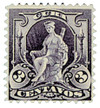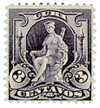
# CU229 - 1899 3c Cuba - Allegory, purple
Cuba #CU229
3¢ Cuba Allegory Stamp
Not long after the U.S. issued overprinted stamps for use in Cuba, new stamps were designed and printed by the U.S. Bureau of Engraving and Printing. The third of these stamps pictures an allegorical representation of Cuba (an allegory is the use of a person or other image to represent an idea). The name Cuba comes from the Taíno language and roughly translates to “where fertile land is abundant” or “great place.”
Few of these scarce Cuba stamps still exist. Over time these stamps may become even more difficult to find, so order now.
Few U.S. Cuba Overprint Stamps Survive!
When the U.S. Battleship Maine mysteriously exploded after being sent to Cuba to protect Americans caught in Cuba’s war for independence, Spain was blamed. Soon after, war was declared and America took administrative control of Cuba as well as Guam, Puerto Rico and the Philippines. The United States established a military government to run Cuba from 1898 until 1902, when the nation’s first president was elected.
Although many native Cubans were angered by U.S. policies, social conditions improved a great deal during the American occupation. Most important was the effort led by Dr. Walter Reed to combat the deadly “yellow fever.”
As an emergency measure in 1899, U.S. stamps were overprinted for use in Cuba. The overprinted stamps included the 1894 Bureau issues and the Series of 1898-99, stamps that were commonly available at that time. Shortly after, the emerging republic issued engraved pictorial stamps with distinctly Cuban themes that included Christopher Columbus, royal palms, and ocean liners.
Two years later, Cuba drafted its own constitution and U.S. military administration in Cuba ended in 1902 with the formation of the Republic of Cuba. In less than four years, Spain’s colonization of the Caribbean and Philippines had ended, and the United States emerged as a world leader.
Cuba #CU229
3¢ Cuba Allegory Stamp
Not long after the U.S. issued overprinted stamps for use in Cuba, new stamps were designed and printed by the U.S. Bureau of Engraving and Printing. The third of these stamps pictures an allegorical representation of Cuba (an allegory is the use of a person or other image to represent an idea). The name Cuba comes from the Taíno language and roughly translates to “where fertile land is abundant” or “great place.”
Few of these scarce Cuba stamps still exist. Over time these stamps may become even more difficult to find, so order now.
Few U.S. Cuba Overprint Stamps Survive!
When the U.S. Battleship Maine mysteriously exploded after being sent to Cuba to protect Americans caught in Cuba’s war for independence, Spain was blamed. Soon after, war was declared and America took administrative control of Cuba as well as Guam, Puerto Rico and the Philippines. The United States established a military government to run Cuba from 1898 until 1902, when the nation’s first president was elected.
Although many native Cubans were angered by U.S. policies, social conditions improved a great deal during the American occupation. Most important was the effort led by Dr. Walter Reed to combat the deadly “yellow fever.”
As an emergency measure in 1899, U.S. stamps were overprinted for use in Cuba. The overprinted stamps included the 1894 Bureau issues and the Series of 1898-99, stamps that were commonly available at that time. Shortly after, the emerging republic issued engraved pictorial stamps with distinctly Cuban themes that included Christopher Columbus, royal palms, and ocean liners.
Two years later, Cuba drafted its own constitution and U.S. military administration in Cuba ended in 1902 with the formation of the Republic of Cuba. In less than four years, Spain’s colonization of the Caribbean and Philippines had ended, and the United States emerged as a world leader.










